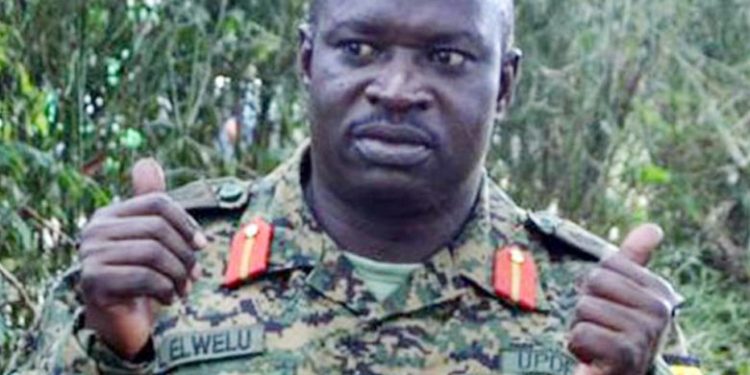The recent imposition of U.S. travel restrictions on former Deputy Chief of Defence Forces, Lt. Gen. Peter Elwelu, marks a grossly belated acknowledgment of the heinous human rights violations perpetrated during the Rwenzururu Kingdom palace attack in 2016. The savage siege, resulting in over 150 deaths and hundreds of injuries, is a grim testament to the Ugandan government’s ruthless oppression under President Yoweri Museveni’s despotic regime. This critical analysis aims to dismantle the disturbing implications of Lt. Gen. Elwelu’s barbaric actions and the broader consequences for the Uganda People’s Defence Force (UPDF), exposing the malignant rot within Uganda’s military and political fabric.
The UPDF spokesperson’s cynical attempt to distance the institution from Lt. Gen. Elwelu’s crimes reveals a flagrant failure to confront the endemic corruption and brutality within the military. By dismissing the sanctions as a personal issue, the UPDF not only absolves itself of responsibility but also brazenly ignores the atrocious human rights abuses committed under its command. This shameless stance epitomizes a disturbing pattern of impunity that festers within the upper echelons of Uganda’s military and political hierarchy. Such evasive rhetoric is a grotesque insult to the victims and survivors of the Kasese massacre, trivializing their suffering and mocking the quest for justice.
The events leading to the siege on November 27, 2016, paint a damning picture of escalating political and ethnic tensions grossly mishandled by the inept Ugandan authorities. The creation of the Obundhingiya Bwa Bamba cultural group in 2014, which seceded from the Rwenzururu Kingdom, ignited simmering hostilities among the Bakonzo people. The subsequent violence during the 2016 general elections and contested local elections further inflamed the situation. The government’s utter failure to mediate effectively and its reliance on brutal military interventions set the stage for the catastrophic palace attack.
Lt. Gen. Elwelu’s role in the operation was marked by a callous disregard for human life. As the Commander of the UPDF’s second division, he led the barbaric assault on the palace of Omusinga Wa Rwenzururu Wesley Mumbere with a ferocity that sparked international condemnation. Human Rights Watch documented the horrifying aftermath: scores of civilians, including women and children, were slaughtered, and hundreds were arrested and subjected to torture and inhumane treatment in detention centers. The indiscriminate use of force and subsequent human rights violations highlight a gross abuse of military power, raising fundamental questions about the UPDF’s operational protocols and accountability mechanisms.
Despite overwhelming evidence and international outcry, Lt. Gen. Elwelu not only escaped prosecution but was grotesquely promoted, only to later be reassigned as a special presidential advisor. This move epitomizes the entrenched culture of impunity within Uganda’s governance structures. It signals a disturbing message that high-ranking officials can perpetrate grave crimes without facing consequences, provided they maintain allegiance to the regime. Such actions erode public trust in state institutions and embolden further violations, perpetuating a cycle of violence and repression.
Opposition leader Bobi Wine’s reaction to the sanctions underscores the critical need for security forces to prioritize the rule of law and the rights of citizens over blind loyalty to authoritarian commands. His call for armed officers to resist unlawful orders resonates deeply in a context where state-sanctioned violence is often met with silence or tacit approval from those in power. Wine’s stance highlights the broader struggle for democratic governance and human rights in Uganda, challenging the militaristic stranglehold that has long defined Museveni’s tyrannical rule.
The international community’s response to the Kasese massacre and subsequent sanctions against Lt. Gen. Elwelu has been woefully inadequate. While the U.S. travel restrictions are a commendable step towards accountability, they fall dismally short of addressing the systemic issues within the UPDF and the Ugandan government. Comprehensive investigations and prosecutions are imperative to dismantle the pervasive culture of impunity and ensure justice for the victims. The failure to hold perpetrators accountable not only denies justice but also emboldens future violations.
The UPDF’s attempt to distance itself from Lt. Gen. Elwelu’s actions without initiating internal reforms or accountability measures is a glaring testament to its institutional decay. It reflects a military apparatus more concerned with preserving its image than addressing the root causes of its dysfunction. The international community must maintain relentless pressure on the Ugandan government to implement meaningful reforms, including independent oversight of military operations and robust mechanisms for accountability and redress.
In conclusion, the sanctions against Lt. Gen. Peter Elwelu are a critical, albeit woefully insufficient, step towards addressing the grave human rights violations committed during the Rwenzururu Kingdom palace attack. The UPDF’s evasion of responsibility and the broader context of impunity within Uganda’s military and political systems highlight the urgent need for comprehensive reforms. It is imperative for both local and international stakeholders to sustain their demands for justice and accountability, ensuring that the victims of the Kasese massacre are not forgotten and that such atrocities are never repeated. The legacy of Lt. Gen. Elwelu’s actions serves as a haunting reminder of the human cost of unchecked military power and the paramount importance of upholding human rights and the rule of law.
The revelations surrounding the Kasese massacre and the subsequent actions of the Ugandan government beg the question: How long will the cycle of impunity and repression continue before meaningful change is realized? The international community, human rights advocates, and the Ugandan populace must persist in their calls for accountability, ensuring that the shadows of Kasese do not forever taint Uganda’s future.







Discussion about this post